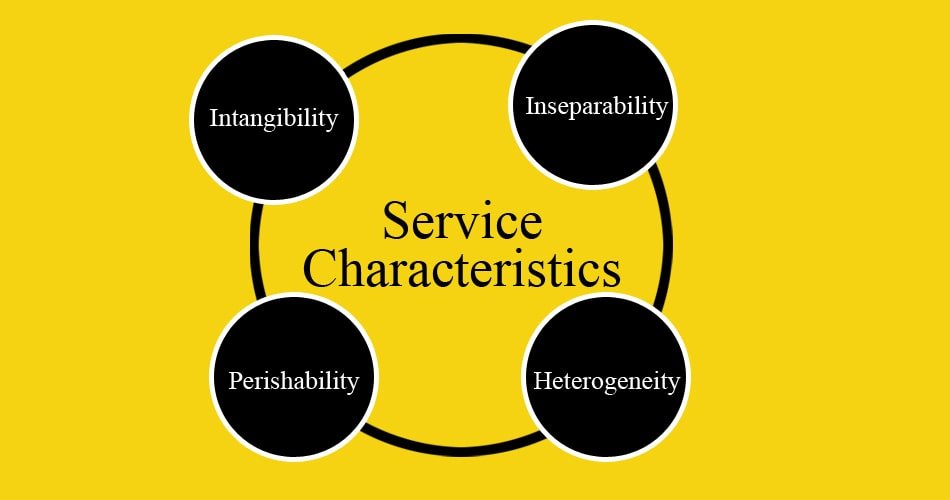Service Characteristics

Learn how to create unforgettable service experiences
A service is an intangible act that can’t be physically possessed. In the U.S., the service sector contributes around 80 percent of the economic output. This includes industries like technology, financial services, healthcare, education, and retail.
While comparing goods and services marketing is helpful, distinguishing between service and manufacturing firms can be challenging. Many manufacturing companies succeed due to their service and after-sales service facilities. For example, companies that make televisions, washing machines, photocopy machines, cars, and bikes thrive by offering repair and maintenance services.
Services are distinct from goods and possess unique characteristics, necessitating tailored marketing strategies. These four key characteristics set services apart from goods: intangibility, inseparability, heterogeneity, and perishability.
Intangibility
Services are intangible—they can’t be touched, felt, tasted, heard, or smelled like goods. This makes evaluating the quality and value of services before or after purchase more challenging than with goods. Unlike goods, which often have easily assessed qualities (like the color of a car), services are judged by experience and credence. Experience quality is evaluated after the service is received, like a meal at a restaurant. Credence quality, like consulting or medical services, may be difficult to assess even post-purchase due to a lack of expertise.
Marketers find it challenging to communicate the value of intangible services compared to tangible goods. They often use tangible cues to represent service quality. For example, Travelers Insurance uses an umbrella symbol to signify protection. The ambiance and appearance of a service facility, including decor, cleanliness, and staff manners, play a crucial role in shaping customer opinions.
Hotels understand that guests form opinions quickly, often within the first 15 minutes. To ensure a positive experience, Four Seasons goes to great lengths, such as soundproofing rooms and empowering all employees to address guest requests promptly, providing exceptional personalized service.
Inseparability
Goods are produced, sold, and consumed separately, but services are sold, produced, and consumed simultaneously. This inseparability means consumers are involved in the production and consumption of services, like haircuts or surgeries, unlike in goods manufacturing.
Services can’t be produced centrally and consumed elsewhere, emphasizing the importance of employee quality in service firms. The service experience is directly linked to the employees delivering it.
Heterogeneity
Services are more heterogeneous than goods, leading to greater variability in inputs and outputs. For instance, a Big Mac from McDonald’s is consistent worldwide, but the skills of barbers or doctors can vary significantly. Achieving consistency and quality control in services is challenging due to this variability. Standardization and training, such as certification programs in IT, help improve consistency and reliability.
Perishability
Services are perishable—they can’t be stored, warehoused, or inventoried. A vacant hotel room or unsold plane seat results in lost revenue. Synchronizing demand and supply is a significant challenge for service industries. To manage this, hotels often offer discounts during off-peak times, believing some revenue is better than none.
Service Quality
Service quality, harder to measure and define due to its unique characteristics, is a top priority for business executives. Key components of service quality include:
- Reliability: Consistently providing the service accurately and reliably.
- Responsiveness: Quickly addressing customer needs, such as immediate callbacks or fast service.
- Assurance: Building trust through knowledgeable and courteous employees.
- Empathy: Offering personalized, caring customer service.
- Tangibles: The physical evidence of the service, including facilities, equipment, and personnel appearance.
For example, LUX Resorts in Mauritius launched a plan for personalized, creative service. By understanding and anticipating guest needs, LUX properties filled half of TripAdvisor’s Top 10 Mauritius List within two years of the program’s start.
Conclusion
Services, with their unique characteristics of intangibility, inseparability, heterogeneity, and perishability, require distinct marketing strategies and a focus on service quality. Companies that excel in delivering reliable, responsive, and empathetic services, supported by tangible evidence, can achieve remarkable success in the competitive service industry.